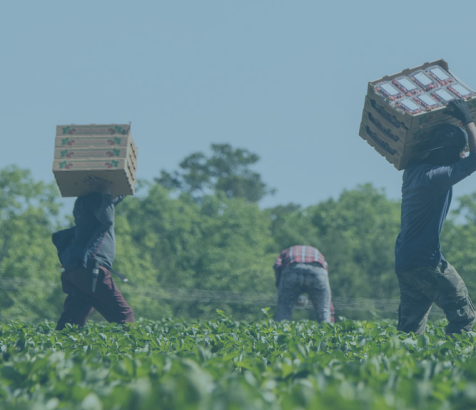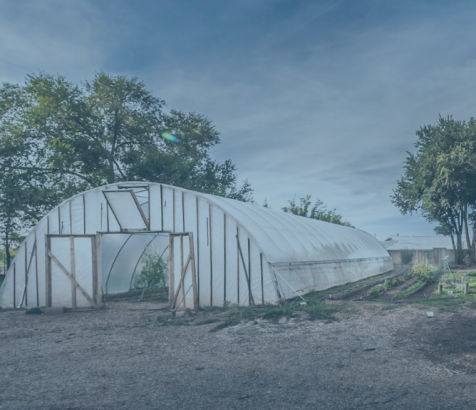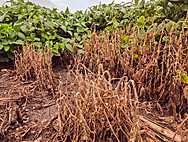Our Work
Safe Fields and Food
Learn about our collaborative teams.

Farmworker Health and Justice
Related News
December 17, 2025
China banned it, but still sells controversial weed killer in America
While paraquat is prohibited from use on farms in China, continued imports to the United States are protected from trade barriers. Paraquat was recently put on a 37-page list of products that were exempt from tariffs President Donald Trump put on China. “The health and environmental harms of paraquat will be felt in U.S. communities for generations, while profits from paraquat sales overwhelmingly flow to Chinese companies,” researchers wrote. Imports to the United States rose from just 11 million pounds in 2012, according to the report from advocacy organizations Alianza Nacional de Campesinas, Coming Clean and the Pesticide Action Network. The report was produced as part of a research series from the advocacy groups that’s examining the harm of pesticides. “Foreign-owned agrochemical companies are profiting while our essential farming communities suffer,” said Judy Robinson, executive director of Coming Clean, in a statement.
Read MoreJanuary 14, 2026
“New science” isn’t needed to ban paraquat in the U.S.
“EPA doesn’t need to wait for new science to ban paraquat in the United States. Credible research meeting EPA’s “gold standard” tenets has already been submitted to EPA’s public docket demonstrating that exposure to paraquat causes harm to farmworkers, farmers, and rural communities, and that its continued registration for use poses an unreasonable risk to these communities. Study after study has shown that people who use or are exposed to paraquat are more likely to develop Parkinson’s disease and other adverse health conditions. The evidence of harm is strong enough that over 70 countries have already banned this toxic pesticide from use. Meanwhile, EPA has declined to review this evidence. Now, by suggesting that we need to wait for “accurate new studies [to] reveal additional risk,” EPA is attempting to push the regulatory reset button to buy chemical corporations profiting from paraquat sales more time.
Read MoreDecember 15, 2025
Thousands of U.S. farmers have Parkinson’s. They blame a deadly pesticide.
Paul Friday remembers when his hand started flopping in the cold weather – the first sign nerve cells in his brain were dying. He was eventually diagnosed with Parkinson’s, a brain disease that gets worse over time. His limbs got stiffer. He struggled to walk. He couldn’t keep living on his family farm. Shortly afterward, Friday came to believe that decades of spraying a pesticide called paraquat at his peach orchard in southwestern Michigan may be the culprit. The pesticide, a weed killer, is extremely toxic. With evidence of its harms stacking up, it’s already been banned in dozens of countries all over the world, including the United Kingdom and China, where it’s made. Yet last year, its manufacturer Syngenta, a subsidiary of a company owned by the Chinese government, continued selling paraquat in the United States and other nations that haven’t banned it.
Read MoreNovember 26, 2025
In this Cancer Alley town, residents are not giving up the fight for cleaner air
The southeastern Louisiana city of St. Gabriel has zero major fast food chain restaurants, pharmacies or laundromats. But there are nearly a dozen chemical facilities within city limits and at least 30 within a 10 mile radius. St. Gabriel is home to the Syngenta agrochemical facility, which repackages a popular but highly toxic farming pesticide known as paraquat under the brand name Gramoxone before it is distributed to other states. The plant is owned by the Chinese company SinoChem Holdings Ltd. A report released in October by Coming Clean, Alianza Nacional de Campesinas and Pesticide Action and Agroecology Network warned of the dangers of paraquat exposure. Banned in over 70 countries, it remains one of the most commonly used chemicals by farmers in the United States for weed management — with the largest point of entry in the last eight years being the Port of New Orleans, according to Jim Vallete, a contributing researcher to the report.
Read MoreNovember 18, 2025
Report: Pesticide banned in 70+ countries widely used in NC
A new analysis showed the harmful life cycle from production to application of a widely used pesticide in North Carolina. The chemical paraquat is a quick-acting herbicide used for weed control. Long-term exposure to paraquat has been associated with thyroid cancer, impaired kidney function, childhood leukemia and Parkinson’s disease. The study "Designed to Kill: Who Profits From Paraquat?" looks at SinoChem Holdings, a Chinese-owned company selling tens of millions of dollars in paraquat to the U.S. each year. Kendall Wimberley, policy manager for the group Toxic Free NC, pointed out it is despite the fact China has banned the chemical. Wimberley argued we should not consider simply banning a pesticide like paraquat but look at the bigger picture."The need to get off of this pesticide treadmill, and we can't just ban one chemical at a time," Wimberley contended. "We need to be looking at these as classes of chemicals."
Read More
October 21, 2025
Paraquat imports climb despite concerns about health impacts
The US has been importing increasing amounts of paraquat, a pesticide widely used in farming that is linked to Parkinson’s disease, even as other countries have banned the chemical amid growing concerns about risks to human and environmental health, according to the findings of a new report. The report cites multiple Chinese factories as supplying paraquat to the US in recent years but singles out Sinochem Holdings, a Chinese government-owned company and parent to paraquat maker Syngenta, as among the key suppliers by way of a Syngenta manufacturing facility in central England. Sales in the US are “helping to prop up demand for a toxic product with a shrinking global market,” the report states. “I hope this research shows that giant, foreign-owned companies are the ones profiting from weak US pesticide regulations,” said Deidre Nelms, spokeswoman for Coming Clean and author of Tuesday’s report.“These companies can’t be trusted to solve the health and environmental problems they had a hand in creating in the first place,” she said. “Farming without pesticides is the only viable way to protect the health of the people who grow and harvest our food.”
Read MoreOctober 21, 2025
U.S. imports a toxic herbicide linked to Parkinson’s disease from countries that ban its use
A new report reveals that the U.S. imports tens of millions of tons of paraquat a year from China and the United Kingdom, countries that have both banned the pesticide due to health and safety concerns. Trade records show that U.S. paraquat imports have increased this decade, even as over 70 countries worldwide prohibit its use. Paraquat exposure has been linked to Parkinson’s disease, thyroid cancer, lung damage, and other serious health conditions. “Corporate greed and weak U.S. pesticide regulations are driving a health crisis for farmworkers, farmers and rural communities. Foreign-owned agrochemical companies are profiting while our essential farming communities suffer,” said Judy Robinson, Executive Director of Coming Clean.
Read MoreOctober 21, 2025
Los EE. UU. importan un herbicida tóxico atado al mal de Parkinson de países que prohíben su uso.
Un nuevo informe revela que los EE. UU. importan decenas de millones de toneladas de paraquat anualmente de China y el Reino Unido, ambos países que han prohibido el uso del plaguicida debido a preocupaciones por el riesgo a la salud y seguridad. Récords comerciales muestran que las importaciones estadounidenses de paraquat han aumentado esta década, aún cuando más de 70 países alrededor del mundo prohíben su uso. La exposición al paraquat se ha atado al mal de Parkinson, cáncer de la tiroide, daño pulmonar y otras condiciones de salud serias. El informe incluye testimonios de campesinos que probablemente fueron expuestos al paraquat en granjas estadounidenses y quienes luego desarrollaron quemazón debilitante de la piel, el mal de Parkinson y daño pulmonar. “Hasta recientemente, no sabía que mi papá probablemente adquirió el mal de Parkinson por sus años de trabajo en los campos de algodón, donde probablemente se usaba el paraquat,” dijo Mirna, miembro de la Alianza Nacional de Campesinas, cuyo padre era campesino en California y falleció por complicaciones del mal de Parkinson. “El gobierno tiene que reconocer el impacto de usar estos químicos porque afectan el ambiente y la salud de nuestra comunidad.”
Read MoreOur Work Share this page: |
The Campaign for Healthier Solutions Farmworker Health and Justice Team Chemical Disaster Prevention Program |
Subscribe to our |
© 2026 Coming Clean Inc. | Coming Clean, Inc., 28 Vernon Street, Suite 434, Brattleboro, VT 05301 • (802) 251-0203











